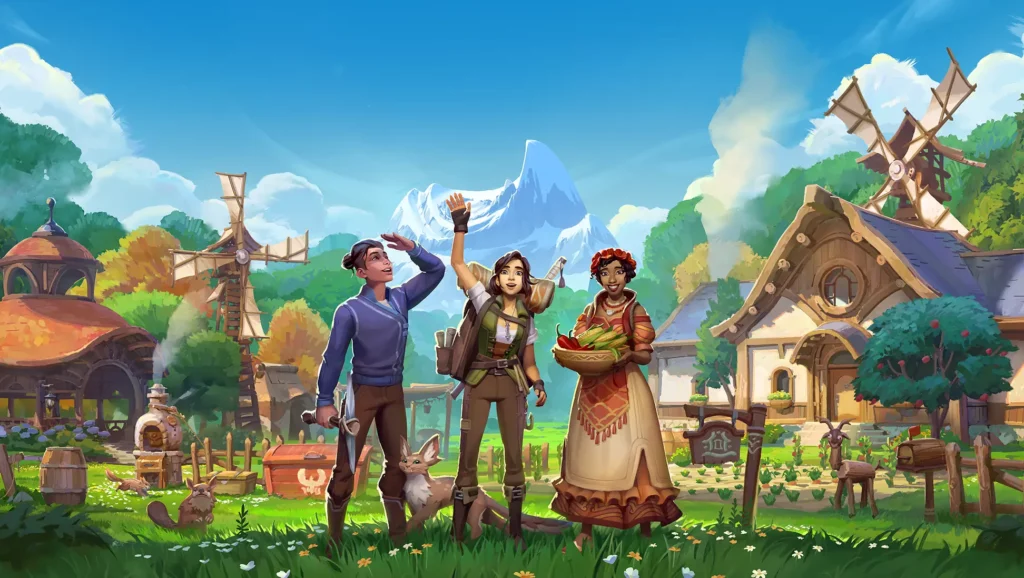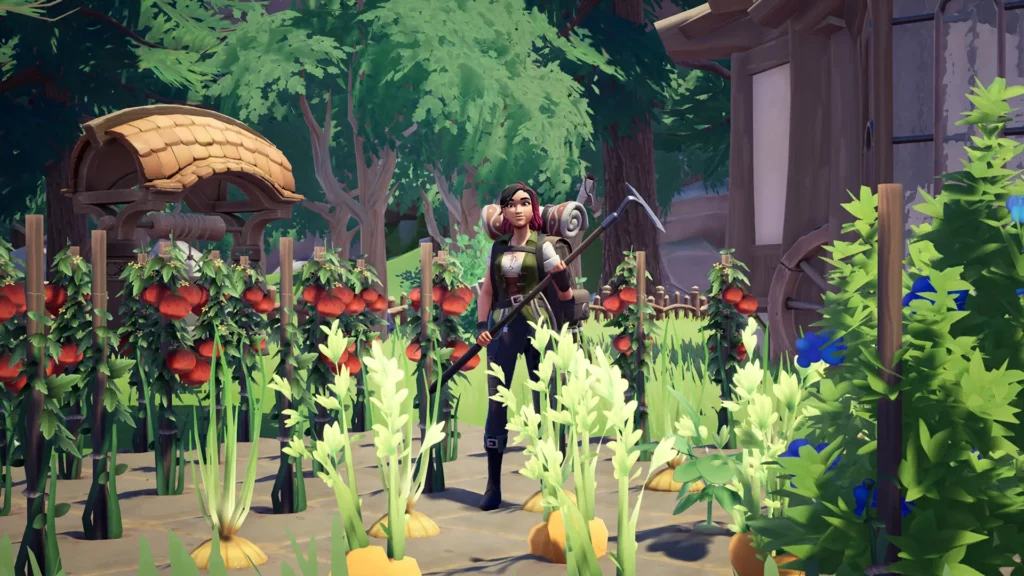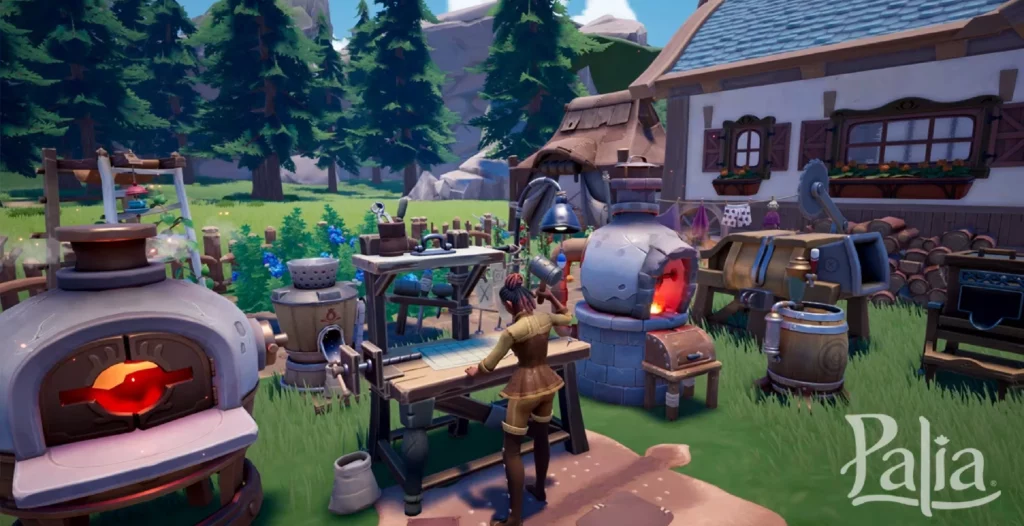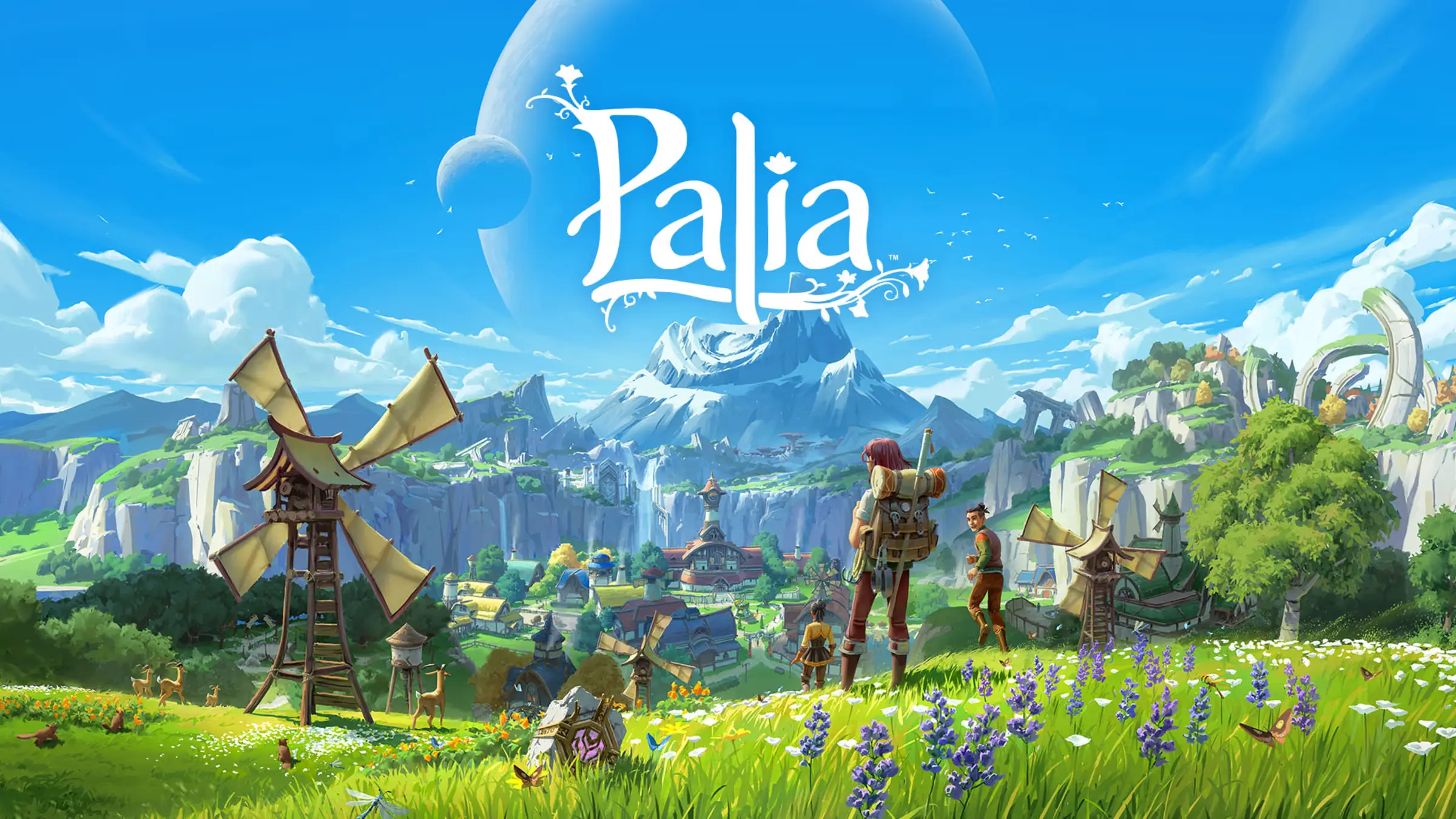Palia redefines the cozy life sim genre by blending the serene charm of titles like Stardew Valley with the interconnected dynamics of an MMO. This enchanting game invites players to settle into a tranquil village, forge meaningful relationships, and build a personalized homestead. With its vibrant landscapes, engaging activities, and welcoming community, Palia offers a delightful escape for gamers seeking both relaxation and social connection. However, an incomplete storyline, occasional technical issues, and limited multiplayer-focused activities reveal areas for improvement. Despite these shortcomings, Palia’s unique blend of cozy gameplay and cooperative spirit makes it a captivating virtual getaway.
A Welcoming World Built for Exploration
Palia’s world is a visual feast, featuring lush forests, serene rivers, and sprawling fields that invite players to explore every corner. The game’s multiplayer framework sets it apart from traditional life sims, encouraging players to interact with others in a shared environment. Activities like fishing or chopping down magical trees provide bonuses when done collaboratively, fostering a sense of teamwork. The community is notably warm, with players frequently using public chats to share the locations of rare resources, often waiting patiently for others to join before collecting them. This cooperative culture stands in stark contrast to the competitive nature of many online games, creating an inviting atmosphere for both solo adventurers and those who thrive in group settings. The shared world feels alive, with players bustling about, gathering materials, or simply enjoying the scenery together, making every moment feel connected and communal.
The game’s design gently nudges players out of their comfort zones, especially for introverts who might prefer solo play. Encountering others while exploring adds a layer of spontaneity, as players can stumble upon strangers hunting, fishing, or crafting. Certain tasks, like felling enchanted trees, require teamwork, ensuring that even the most solitary players occasionally collaborate. This balance between individual freedom and cooperative play creates a dynamic experience that feels both personal and communal. The community’s positivity is a highlight, with players often going out of their way to help strangers, such as announcing the discovery of valuable materials and coordinating group efforts to collect them. This refreshing kindness makes Palia’s world feel like a true haven, where players can relax and connect without the toxicity often found in other multiplayer games.
Engaging Activities with a Relaxed Vibe
At its core, Palia offers a rich array of activities designed to keep players engaged while maintaining a stress-free atmosphere. Fishing is a standout, requiring players to actively manage their rod as fish leap and resist, adding a layer of skill to an otherwise tranquil task. Unlike the often simplistic fishing mechanics in other life sims, Palia’s version feels dynamic and rewarding, striking a balance between challenge and relaxation. Hunting introduces another layer of engagement, with players tracking creatures that burrow or leap into trees, dodging arrows with surprising agility. However, the game’s overly aggressive aim-assist can sometimes frustrate, as arrows veer toward unintended targets, disrupting the intended chill vibe. While the goal is to keep activities low-stress, this feature can feel like it’s trying too hard to simplify the experience, occasionally undermining the player’s sense of control.
Cooking and bug-catching round out the classic life sim tasks, both executed with care and polish. Cooking allows players to experiment with recipes, turning gathered ingredients into satisfying dishes, while bug-catching offers a gentle, meditative pursuit. These activities align with Palia’s cozy ethos, providing players with familiar yet well-crafted mechanics that feel fresh in the context of the game’s vibrant world. The variety of tasks ensures there’s always something to do, whether players are gathering resources, crafting items, or simply enjoying the serene act of catching fireflies under a starry sky. While the game excels at creating a laid-back atmosphere, some mechanics, like the overly helpful targeting in hunting, can feel intrusive, reminding players that Palia occasionally overcorrects in its pursuit of relaxation.

Crafting a Personalized Homestead
Palia’s home-building system is a highlight, offering a modular approach that makes designing a dream home both intuitive and rewarding. Unlike other life sims that either restrict control over layouts or overwhelm with complex building modes, Palia strikes a perfect balance. Players unlock schematics for rooms and structures, which can be snapped together to create a customized home. Once the foundation is set, players can decorate with furniture, trinkets, and other items, arranging them on a grid for precise placement. This system allows for creativity without getting bogged down in overly technical details, making it accessible for casual players while offering enough depth for those who love to tinker.
The drive to expand and perfect the homestead fuels much of Palia’s gameplay loop. Gathering resources like lumber, ore, and rare materials becomes a motivating pursuit, as players work to unlock new schematics or craft high-quality furniture. Progression systems tied to resource gathering add a sense of growth, with players unlocking better tools—like faster hoes or stronger bows—that make tasks more efficient. Crafting stations, such as looms for fabric or furnaces for glass, further enhance the experience, allowing players to create more complex items as they progress. Unlike some life sims that impose strict time gates, Palia allows players to move at their own pace, making the grind feel rewarding rather than restrictive. The result is a home-building system that feels deeply personal, encouraging players to invest dozens of hours into creating a space that reflects their unique style.
A Narrative with Untapped Potential
Palia’s main story offers a lighthearted adventure through ancient ruins, where players uncover secrets about a long-lost human civilization and the magic that led to its downfall. Accompanied by charming NPCs, players navigate scenic environments, solve simple puzzles, and platform through ruins. The narrative is engaging, with a playful tone that aligns with the game’s cozy sensibilities. However, the story feels frustratingly incomplete, even with the recent Elderwood expansion. The expansion adds a brief continuation, introducing a new dungeon and a handful of quests, but it fails to resolve the main plot, leaving players on yet another cliffhanger. While the story’s brevity makes it easy to complete in a few hours, its lack of closure can leave players wanting more depth and resolution.
Despite its shortcomings, the narrative provides a welcome break from resource gathering and crafting. The lore surrounding the world’s history and its magical past adds intrigue, while the NPCs who join players on quests bring humor and personality to the experience. Exploring ruins feels like a gentle adventure, with platforming and puzzles that are approachable yet satisfying. For players who enjoy diving into a game’s world, the story offers just enough to spark curiosity, even if it doesn’t fully deliver on its potential. The hope is that future updates will flesh out the narrative, giving players a more complete arc to follow.

Forging Bonds with Memorable NPCs
Palia’s cast of 26 NPCs breathes life into the village, each with distinct personalities and story arcs that unfold through quests and daily interactions. For instance, Kenyatta, the mayor’s sarcastic daughter, starts off aloof but reveals deeper layers as players help her discover her passions, creating a rewarding arc that feels personal. Similarly, Elouisa, a cryptid-obsessed eccentric, can be grating but adds humor and charm, growing on players over time. These characters feel well-written, with dialogue that reveals their quirks and complexities, making every interaction a chance to learn more about the village’s inhabitants.
Building relationships is a core part of Palia, with players able to forge friendships or even pursue romantic connections through a robust dating system. The ability to date multiple characters adds flexibility, catering to players who want to explore different dynamics. However, time-gated mechanics can slow progress, as players are limited to one conversation per in-game day (30 minutes in real time) and one gift per real-world day. This restriction is particularly noticeable early on, when earning village citizenship depends on building relationships, making the process feel unnecessarily drawn out. Despite this, the depth of the NPCs’ stories and the satisfaction of watching bonds grow make the system a highlight, even if it occasionally tests players’ patience.
The Elderwood Expansion: A Vibrant Addition
The Elderwood expansion, the largest update since Palia’s 2023 debut, introduces a colorful new region filled with unique creatures and resources. Players can hunt frog-like enemies that spit reptilian phlegm or gather new materials like palium and platinum, which offer fresh goals for veteran players. The expansion also adds Ulfe, a wild and quirky NPC whose chaotic energy stands out from the existing cast. New gadgets, such as relics that simplify resource tracking, enhance the quality of life, making exploration more enjoyable. While the expansion doesn’t overhaul the core game, it injects much-needed variety into the world, with vibrant environments and creatures that feel distinct from the base maps.
The Elderwood region is a visual treat, with colorful landscapes and odd creatures that add a sense of wonder to exploration. The new content feels like a natural extension of Palia’s formula, offering more of what players love without disrupting the game’s cozy charm. For those who have already spent dozens of hours gathering resources, the expansion provides fresh objectives and a new area to explore, ensuring that the world continues to feel alive and evolving.
Minigames and Creative Distractions
Palia keeps players engaged with a variety of minigames, from a hotpot-themed card game to intricate platforming puzzles. The card game is surprisingly addictive, offering a fun diversion that can eat up hours, while platforming challenges test players’ skills in a low-stakes setting. However, the platforming mechanics can feel clunky, with inconsistent climbing controls that sometimes lead to frustrating falls. While these missteps are more annoying than punishing, they highlight areas where Palia’s ambition outpaces its execution. Other activities, like sliding picture puzzles, add unexpected charm, making the game’s experimental side a net positive despite occasional hiccups.
These distractions add variety to the gameplay loop, ensuring that players always have something new to try. Whether mastering a card game or solving a puzzle, these activities break up the routine of resource gathering and crafting, keeping the experience fresh. While not every minigame lands perfectly, their inclusion reflects Palia’s willingness to take risks, adding depth to an already engaging world.

Areas for Improvement: Technical and Design Flaws
Despite its many strengths, Palia is not without flaws. Technical issues, such as NPCs sinking into the ground or visible pop-in during exploration, persist, though they’ve improved since the game’s early days. Loading times between map areas can feel excessively long, disrupting the flow of gameplay. Performance on the Nintendo Switch is particularly lackluster, with poor visuals and sluggish gameplay that make other platforms a better choice. These issues, while not game-breaking, can detract from the otherwise immersive experience.
Design-wise, Palia falls short in some areas. The game’s multiplayer features, while a key selling point, feel underdeveloped, with too few activities that encourage group play. For a title billed as an MMO, the lack of robust social features is surprising, limiting the potential for dynamic player interactions. Additionally, many objects in player homes, such as beds or sinks, cannot be interacted with, making the homestead feel more like a display than a lived-in space. While small additions, like the ability to toggle light switches, help, the lack of interactivity can make home-building feel less immersive than it could be. With future updates planned, there’s hope that these shortcomings will be addressed, but they remain noticeable in the current version.
A Cozy Adventure That Keeps You Coming Back
Palia masterfully combines the soothing charm of a life sim with the social possibilities of an MMO, creating a world that’s hard to leave. Its engaging activities, from fishing to home-building, offer endless opportunities to relax and create, while the vibrant community fosters a sense of connection. The modular home-building system and well-crafted NPCs add depth, making every moment feel personal and rewarding. Despite an incomplete story, limited multiplayer activities, and persistent technical issues, Palia remains a captivating destination for gamers. Whether collaborating with friends to gather resources or perfecting a cozy homestead, this game offers a delightful escape that’s perfect for those seeking a balance of relaxation and connection. With over 70 hours of gameplay to explore, Palia is a virtual getaway that invites players to settle in and stay awhile.
